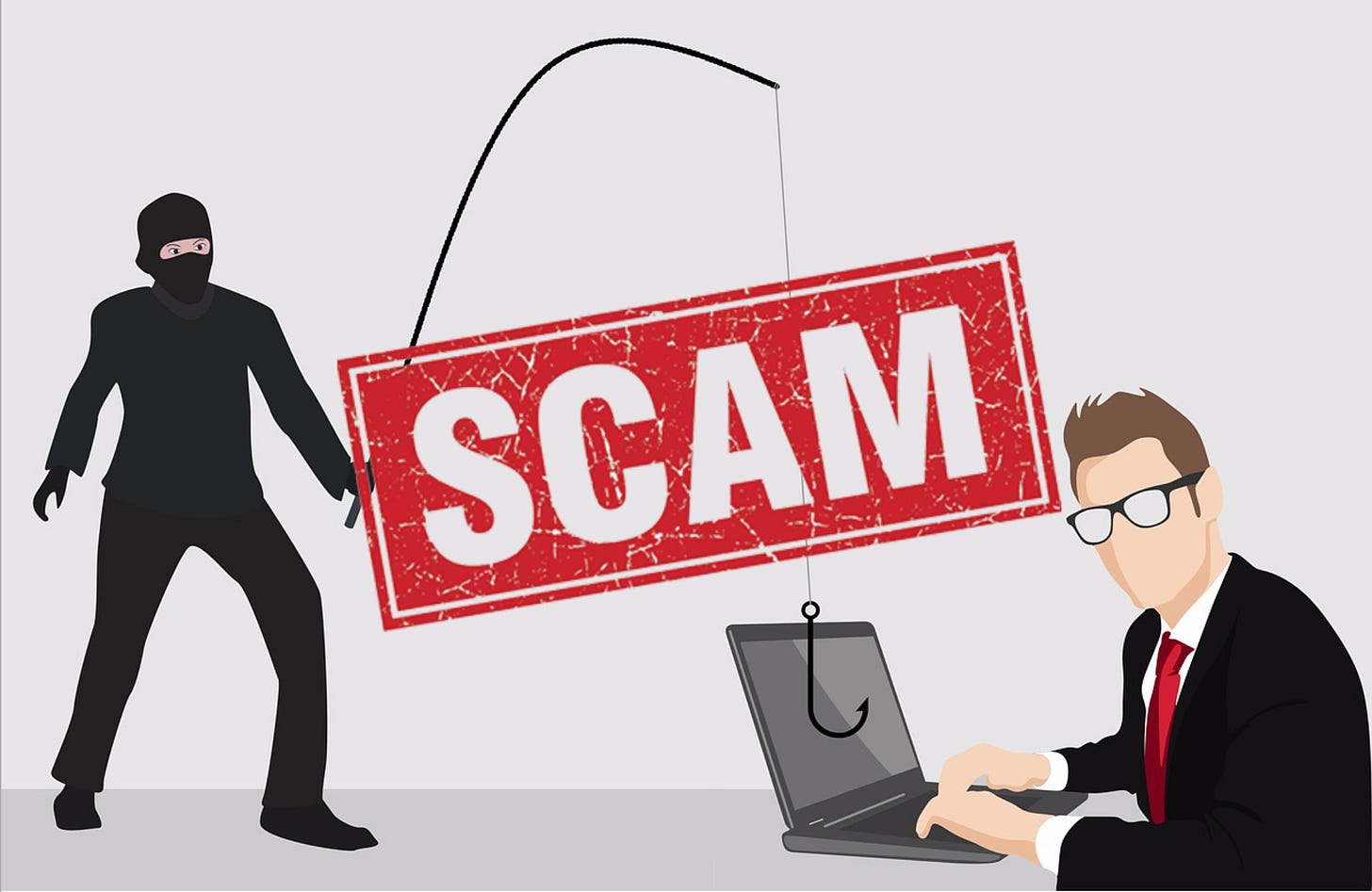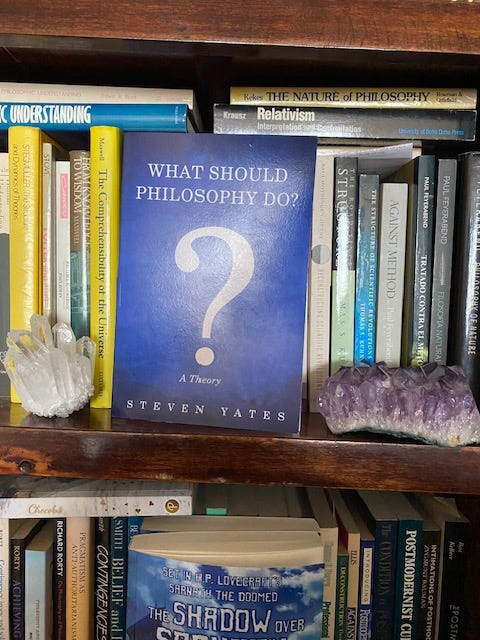This is What a Phishing Expedition Looks Like
Today's Internet is loaded with predators! Act accordingly!
Every so often I decide to set aside politics and just serve up a public service announcement. This is one of those times.
I had someone try to scam me yesterday. It wasn’t personal, I’m sure. The scammer probably sent out thousands of these things, maybe tens of thousands, figuring he or she could cash in if just one easy mark fell for it.
Fortunately my BS alert went off full blast.
I’ve written this because someone else won’t be so fortunate. I’m constantly reading about people being scammed, sometimes out of their life savings, because they clicked on something they shouldn’t have in an email from someone they didn’t know (or maybe it was an attachment) and opened Pandora’s box.
What I received in yesterday morning’s email looked like this, as much as Substack will allow me to reproduce it — if you’re reading this DON’T YOU DARE CLICK ON ANYTHING!!! My purpose in reproducing this almost exactly the way I received it is so that from here on out, no one who sees this will have the slightest doubt what one of these looks like.
START OF SCAM EMAIL MESSAGE
PayPaI Customer Care via Docusign
To PayPaI Customer Care · Wed, Feb 5 at 8:15 AM
PayPaI Customer Care sent you a document to review and sign.
PayPaI Customer Care
p.pcase828jamesmcavoy@gmail.com
We’ve identified an unauthorized transaction made from your PayPal account to Coinbase:
Amount: $412.45
Transaction ID: PC-5193847206-789KMLP
Date 02/05/2025
To safeguard your account and ensure a full refund,
Please reach out to our Customer Support team immediately at (855)X (704)X (3347)
Our representatives are available 24/7 to assist you in resolving this issue and preventing any additional unauthorized activity.
Your account’s security is our top priority, and we’re fully committed to helping you address this matter swiftly. We appreciate your immediate attention to this alert.
Best regards,
PayPal Security Team
(855)X (704)X (3347)
Do Not Share This Email
This email contains a secure link to Docusign. Please do not share this email, link, or access code with others.
Alternate Signing Method
Visit Docusign.com, click 'Access Documents', and enter the security code:
4139E42F4B2D4623967BD0AB3A4B63B24
About Docusign
Sign documents electronically in just minutes. It's safe, secure, and legally binding. Whether you're in an office, at home, on-the-go -- or even across the globe -- Docusign provides a professional trusted solution for Digital Transaction Management™.
Questions about the Document?
If you need to modify the document or have questions about the details in the document, please reach out to the sender by emailing them directly.
Stop receiving this email
Report this email or read more about Declining to sign and Managing notifications.
If you have trouble signing, visit "How to Sign a Document" on our Docusign Support Center, or browse our Docusign Community for more information.
Download the Docusign App
This message was sent to you by PayPaI Customer Care who is using the Docusign Electronic Signature Service. If you would rather not receive email from this sender you may contact the sender with your request.
END OF EMAILED MESSAGE
A Few Notes:
(1) After seeing this, naturally I went to my PayPal account logging in the way I normally do, to ensure that nothing was amiss. Nothing was. Everything looked the way it should. There’d been no Coinbase transaction.
(2) While superficially it looks legit, coming from a “PayPal Security Team” and all that, that’s not PayPal’s logo. It’s similar, but the colors are wrong. Suggestion: it’s helpful to know what these corporate logos look like even if you never do business with them.
(3) Note the email address. I’ve not redacted it. Obviously this is not from PayPal. I can’t believe how many people still won’t check an email address to make sure it’s coming from where the logo says it’s coming from.
(4) Note the appeal to fear … an unauthorized transaction was made from your account. Ominous sounding, right? Fear often impels people to act without thinking. Especially when they see …
(5) … the promise of an immediate fix … if you click on the link provided. Note also the urgency “nudge”: “We appreciate your immediate attention to this alert.”
(6) LIFE ADVICE YOU CAN PUT IN YOUR WALLET: Never, ever, click on something in an email like this!
I’d like to think this kind of post isn’t needed, because we’re all sufficiently Internet-savvy now.
I’m sure my readers are.
But like I said at the outset, every few weeks I read about somebody scammed out of an enormous sum of money, sometimes their live savings.
They didn’t check the email address to make sure it was legit, or succumbed to fear, or maybe just weren’t thinking at all.
That means those of us who care about the well-being of people still have work to do, and it begins with showing what one of these phishing expeditions looks like.
The more the better!
If one person happens to find her way in here, sees this, recognizes the danger the next time it shows up in her inbox, avoiding being scammed, I’ve done my job.
Summary Comment.
A materialistic society, one where so many interactions and transactions are anonymous, is bound to breed this sort of thing. I don’t know why the scammer selected PayPal or Coinbase. You’ll also see these purporting to be from Amazon, and it will be the same thing: if you check the email address, it’s not from Amazon. Same with eBay … any corporation that either facilitates transactions or sells huge quantities of goods online could be used.
I’ve nothing against Coinbase, but cryptocurrency is the area where I’ve seen the most scams! That’s one reason I won’t touch crypto no matter how lucrative its proponents claim it is! I tend to trust what I can hold in my hands, or what can easily be converted to something I can hold in my hands. Like cash, or precious metals.
The Internet is full of predators and scam artists. Act accordingly, know the signs of danger, protect yourself accordingly.
_________________________
Steven Yates is a (recovering) ex-academic with a PhD in Philosophy. He taught for more than 15 years total at several universities in the Southeastern U.S. He authored three books, more than 20 articles, numerous book reviews, and review essays in academic journals and anthologies. Refused tenure and unable to obtain full-time academic employment (and with an increasing number of very fundamental philosophical essays refused publication in journals), he turned to alternative platforms and heretical notions, including about academia itself.
In 2012 he moved to Chile. He married a Chilean national in 2014. Among his discoveries in South America: the problems of the U.S. are problems everywhere, because human nature is the same everywhere. The problems are problems of Western civilization as a whole.
As to whether he’ll stay in Chile … stay tuned!
He has a Patreon.com page. Donate here and become a Patron if you benefit from his work and believe it merits being sustained financially.
Steven Yates’s book Four Cardinal Errors: Reasons for the Decline of the American Republic (2011) can be ordered here.
His philosophical work What Should Philosophy Do? A Theory (2021) can be obtained here or here.
His paranormal horror novel The Shadow Over Sarnath (2023) can be gotten here.
Should you purchase any (or all) books from Amazon, please consider leaving a five-star review (if you think they merit such).







